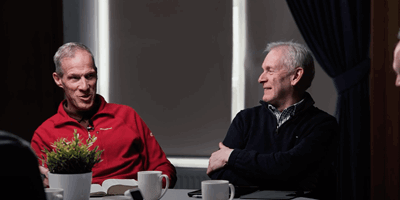In philosophy, this question falls into the category of epistemology, which basically investigates the origin, nature and methods of human knowledge. Some of the questions covered in epistemology are ‘how can we know what is true?’, ‘can we be certain about truth?’, and ‘who determines what is true?’ In short, epistemology is the study of knowledge and truth: how do we know what we know?
Some people are uninterested in this area of study and therefore dismiss it, but our attitude to truth and what we believe has implications in every area of our lives. We have all experienced occasions when, thinking the bus would arrive at 12.15pm, we duly arrived at the stop only to learn that it had gone. We may have been sincere in our beliefs, thinking we knew the truth, but our ideas didn't agree with the real world. Reality proved that we were wrong.
What is truth?
Truth is what corresponds to reality (what actually exists). In New Evidence That Demands a Verdict (NETDV), Josh McDowell quotes J P Moreland (p588) as saying that truth is a ‘relation of correspondence between the thought and the world. If the thought really describes the world accurately, it is true. It stands to the world in a relation of correspondence.' McDowell further quotes from Peter van Inwagen (p588): ‘our beliefs and assertions are thus related to the world as a map is related to the territory: it is up to the map to get the territory right, and if the map doesn't get the territory right, that’s the fault of the map and no fault of the territory’. To apply these statements to the earlier example, our belief about the time of the bus did not agree with reality. Conviction does not guarantee correctness: it is possible to be sincerely wrong. [Regardless of the reason why we missed the bus, our mistaken beliefs did not, and could not alter reality. Perhaps the bus timetable was outdated or it was read inaccurately, but our minds could not change the facts - we were late.] The truth was unchanging and objective. However, our position in relation to the truth was wrong, and we suffered as a result. Truth is like the North Star; un-moving and constant, it does not change. Rather, it is we who change and therefore need to be reoriented around the truth. In this example, being wrong had only minor consequences. However, being wrong in other areas of life can be disastrous.
About 2000 years ago, a man called Pontius Pilate asked the question ‘what is truth?’ (John 18:38). He wasn't asking about truth in relation to transport, education, law or anything else, but in relation to the Lord Jesus Christ. The Lord Jesus had just made a remarkable assertion: ‘for this cause I have come into the world, that I should bear witness to the truth. Everyone who is of the truth hears my voice’ (John 18:37). Earlier in John's Gospel He had said, ‘I am the way, the truth, and the life. No one comes to the Father except through me’ (John 14:6). The Lord Jesus claimed to be a testifier of the truth; He knew the truth and had come to make it known to all people. Christ tells us the truth about origins, sin, salvation and eternity. His voice isn’t an opinion on these matters, but the very truth, eternal and immutable. Not only that, the Lord Jesus said that He (personally) was the truth – that is, He is the embodiment of truth, the ultimate reality. As a result we can confidently believe everything He said. The consequences of being wrong about the Lord Jesus are serious indeed – they are eternal.
Theories on truth
Since Pilate's famous inquiry 2000 years ago, many have asked and continue to ask the same question. The field of epistemology examines the many and varying ways that through the centuries people have tried to determine the truth. Some are as follows:
Rationalism
Empiricism
Scepticism
Pragmatism
Relativism
Rationalism
The father of rationalism was a man called Renée Descartes, well known for the axiom ‘Cogito, ergo sum (I think, therefore I am)’. To put it simply, Descartes maintained that human beings are born with an innate knowledge of truth, which means that truth can be deduced by reason and logic alone. This laid the foundation for the idea that truth originates in man, not God. Man is the arbitrator of truth; man replaces God in the position of authority. The obvious problem with rationalism is that different individuals come to different conclusions as to what is right and wrong. If truth resides in me, what happens when someone else has a contradictory viewpoint? Working from the same base (their own reason) different people can come to wildly varying conclusions. How can we know whose decision is correct? My society, my family and my brain cannot have the final say on truth.
Empiricism
In response to rationalism, another viewpoint emerged which is known as empiricism. John Locke was the father of empiricism. He argued man had knowledge a posteriori and not a priori (as Descartes maintained). Man is born like a blank slate: as opposed to possessing innate knowledge, he learns truth through his senses. Mankind determines truth through the scientific method alone, through experimentation and the accumulation of data. Whilst, when applied to the fields of science and mathematics, this viewpoint has its merits, it cannot determine morality and universal truth. It cannot provide a sure foundation for right and wrong, for good and evil. Questions about origins, purpose and meaning cannot be put in a test tube and examined in a laboratory; therefore neither rationalism nor empiricism are safe guides for understanding God’s salvation and man’s eternal destiny.
Scepticism
An offshoot of empiricism is an epistemology known as scepticism. One of the main propagators of this idea was a man called David Hume. McDowell summarises the essence of Hume's scepticism (New Evidence That Demands a Verdict, p627): ‘Hume said that because we never actually observed (experience) causality (what causes something that happens), we cannot know for certain that any particular cause and effect are connected. Hume did not deny causality, but only that we can infer anything from it. He denied that we can know the truth about a cause from an effect.’ Many people today adopt Hume’s scepticism when faced with questions about the origin of the universe. They inject billions of years into the equation and then affirm ‘it’s so long ago, we cannot know’.
One of Hume's famous quotations summarises his scepticism. Writing about books which deal with spiritual matters, he said this (New Evidence That Demands a Verdict, p628): ‘let us ask does [such a book] contain any abstract reasonings concerning quantity or number? No. Does it contain any experimental reasonings concerning matters of fact or existence? No. Commit it to the flames: for it can contain nothing but sophistry and illusion.’ Basically, Hume is saying that we cannot know about God, about creation or salvation – the only thing we can know is that we cannot know. This is a glaring contradiction. Genesis is a book dealing with spiritual matters, whose account of creation cannot be verified by ‘experimental reasonings’ and therefore has to be ‘committed to the flames’. However, the contradiction within Hume's famous dictum is that the quotation itself cannot be verified by experimental means. Since we cannot authenticate Hume's scepticism in the laboratory, according to his own reasoning it must be committed to the flames. NETDV summarises with the words of Ravi Zacharias (p631): ‘Hume's sceptical deduction that all judgment about reality be suspended is self-defeating because his call to suspend judgment is in itself a judgment about reality.’
Pragmatism
Another way people try to determine what is right and wrong is by considering what works. Pragmatism says that the end justifies the means. As long as the conclusion is satisfactory and we reach a happy ever after, then any way leading to that end is justified. However, this line of thinking is doomed before it gets off the ground. The student who passes his exam by cheating has achieved his goal. The criminal who escapes justice through lying in court has attained his goal. And pragmatism maintains that such practice is defensible. Because wrong means can achieve a desired end does not make that method of behaviour correct. Pragmatism therefore is no safe guide to determining truth.
Atheism and evolution cannot provide us with a foundation for truth either, since both are committed to material causes. In a world where only matter exists, there can be no place for logic or reason, for both by definition are immaterial. A universe that came from nothing by chance is not bound to follow any law; a mindless process can never give us truth. This worldview cannot allow for a mind or the process of thinking, only neurons and chemical processes in the brain which produce physical results. But how can that discover truth? Atheism ties itself in knots by its obstinate insistence that, when it comes to the search for truth, there is nothing beyond the material.
Relativism
Those who believe that truth is entirely subjective are called relativists. NETDV (p589) says that relativism ‘is the theory that there is no objective standard by which truth may be determined, so the truth varies with individuals and circumstances’. Relativism (it's true for you but not for me) is a philosophy worshipped by our post-modern Western culture. Post-modernism, a multifaceted worldview covering a broad range of topics, can be applied to philosophy, the arts and languages. In relation to epistemology, post-modernism is a culture or mind-set which rejects absolutes. In post-modernism there is no truth, no foundation, no authority to determine right and wrong. Post-modernism rejects any form of metanarrative (an overarching account or interpretation of events and circumstances providing a pattern or structure which gives meaning to people). In post-modernism everything is relativized; as a result, there is no meaning to life, and each individual is free to determine truth for himself. Truth has no author. Rather, everyone is an author writing his own perception of truth.
Within post-modernism, says NETDV (p617), ‘all great philosophical systems are dead, all cultural accounts are limited, all that remains are little stories accepted as true by different groups and cultures. Claims to universal truth – meta-narratives – are oppressive, “totalizing” and thus must be resisted’. Relativism says that the only truth is that there is no truth. Since truth is determined by the individual, it changes according to time, circumstance and culture. But relativism is self-defeating. Norman Geisler is usefully cited in NETDV (p593): ‘most relativists believe that relativism is absolutely true and that everyone should be a relativist. Therein lies the self-destructive nature of relativism. The relativist stands on the pinnacle of an absolute truth and wants to relativize everything else.’ The statement that the only truth is that there is no truth is evidently contradictory and self-refuting. Relativists cut off the branch on which they are sitting.
That truth is objective and absolute seems patently obvious to all. In areas like law, mathematics, science and engineering, we all readily accept that truth is objective. The equation 2+2 = 4 is true all of the time and in every culture. Some might sincerely believe that two plus two is five, the majority might believe it is five, it might make some people happy if it were five, but this does not change the reality of the equation. Facts are facts, and our minds cannot change them. We need instead to orientate our beliefs around the truth and not vice versa. Beliefs can be wrong, but not the truth itself.
Most will agree that truth is objective in the fields cited above. The difficulty seems to come, however, when we are thinking about morality or spirituality. Why is it that we contradict ourselves when it comes to these particular areas? Why, when it comes to God, salvation and eternity do we seek to reinvent the wheel and abolish the concept of absolute truth? Could it be that we suppress the truth because we do not want to be accountable to God? As NETDV puts it (p596), some people ‘are deeply hostile to the thought of anything that in any sense stands in judgment over them. The idea toward which they are most hostile is, of course, the idea of there being a God.’ Relativism is like the ostrich that buries its head in the sand, hiding from the truth by subjectivising it. This expedient, however, by no means changes the reality it seeks to avoid.
Here is the apostle Paul’s analysis:
men ... suppress truth in unrighteousness, because what may be known of God is manifest in them, for God has shown it to them ... although they knew God, they did not glorify him as God ... but became futile in their thoughts. (Romans 1:18-21)
These verses tell us that people know truth is objective and originates from a divine source, and yet, despite abundant evidence of God's existence, reject the evidence and embrace foolishness. In their sin, men and women would rather side with relativism and folly instead of acknowledging God. They have ‘exchanged the truth about God for a lie’ (Romans 1:25, ESV).
Although relativism is currently at the forefront of post-modern thought, the Bible shows us that it is as old as the hills. Back in the period of the Judges, some three thousand years ago, ‘there was no king in Israel: everyone did what was right in his own eyes’ (Judges 21:25). With no human lawgiver in the land, people determined their own truth – truth was up for grabs. The consequences were disastrous: immorality, murder and lawlessness were the hallmarks of the day. The psalmist raises the pertinent question: ‘if the foundations are destroyed, what can the righteous do?’ (Psalm 11:3) A world without absolutes is bleak indeed; like a building without sure foundations, everything begins to crumble and chaos ensues.
The Gospel
Contrasted to the darkness of relativism, with ‘everyone doing what is right in their own eyes’, the Bible offers a vastly different picture. The Bible explains exactly what the truth is and how we can know it. The only way of knowing anything for sure is if it emanates from a transcendent, omniscient and eternal source – God. Because He cannot lie (Titus 1:2), and is Himself the author of truth, divine revelation is the only sure and certain epistemology because it originates in God. He meets every criteria and category for knowing things accurately. Apart from God we cannot know the truth; moreover, we cannot know God by ourselves. Here is the Bible’s verdict: ‘since, in the wisdom of God, the world through wisdom did not know God, it pleased God through the foolishness of the message preached to save those who believe’ (1 Corinthians 1:21). In His mercy God has taken the initiative and made Himself known to us. Though we are lost in darkness, the God who is Light has shone into human history so that we might know Him personally.
"We have been deluded into thinking that we can create our own realities and become the gods of our own lives. However, God, the ‘I AM’, the ultimate reality and authority in the universe, will not be mocked."
However, the devil, the father of lies (John 8:44), is at work blinding the minds of people today through false philosophies like relativism and post-modernism. Paul sums it up like this: ‘The god of this world [Satan] has blinded the minds of the unbelieving so that they might not see the light of the gospel of the glory of Christ who is the image of God' (2 Corinthians 4:4, NASB). We have been deluded into thinking that we can create our own realities and become the gods of our own lives. However, God, the ‘I AM’, the ultimate reality and authority in the universe, will not be mocked.
He has revealed Himself clearly and finally in His Son, the Lord Jesus Christ. The Bible says that ‘no one has seen God at any time. The only begotten Son, who is in the bosom of the Father, he has declared him’ (John 1:18). That is to say, the Lord Jesus has fully explained God to us. Being Himself God, He is the complete expression of everything God is in His love, grace, wisdom and holiness. He said, ‘I am the way, the truth and the life. No one comes to the Father except through me’ (John 14:6). This sublime statement abolishes relativism, allowing no wriggle room of any kind, for the Lord Jesus claims to be the only way anyone can come into a relationship with God. This is true for all people, in all places, and at all times regardless of gender, race and class. Furthermore, such a statement excludes every other religion and belief system. Jesus Christ alone can save us from our sins. After Christ returned to heaven, the apostle Peter reaffirmed His uncompromising message: ‘there is salvation in no one else; for there is no other name under heaven that has been given among men by which we must be saved’ (Acts 4:12, NASB).
Truth is absolutely exclusive; no one can be saved except through faith in the Lord Jesus. At the same time, truth is wonderfully liberating because, as the Lord Jesus said, ‘you shall know the truth, and the truth will set you free’ (John 8:32). That is to say, trusting Christ sets us free from the lies and slavery of sin so that we might enjoy peace with God. The Lord Jesus died for our sins on the cross of Calvary in order that we might be saved. But that wasn’t the end. He rose again on the third day as the ultimate vindication and authentication of the truth He preached. He now offers salvation to all who come to Him in repentance and faith. This is the truth – the only way.


































